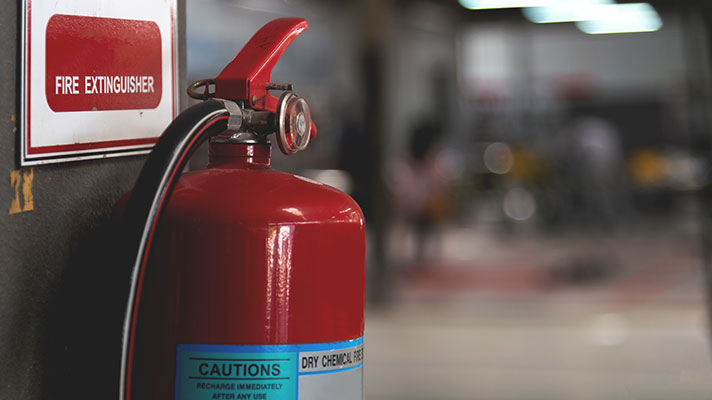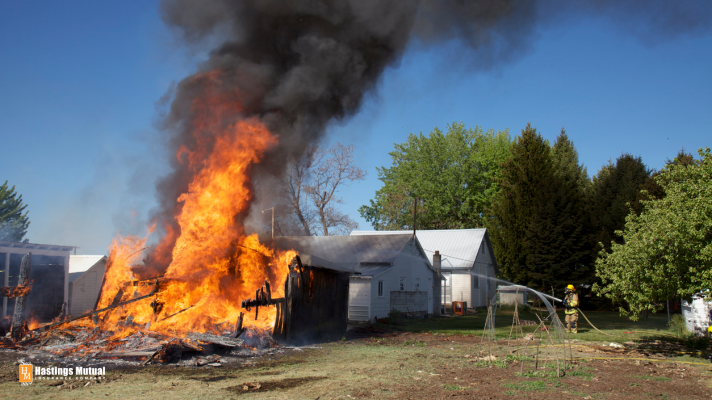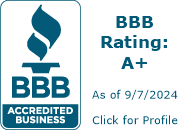Secure your future today!
Do Fire Extinguishers Expire?
What you need to know about your home, farm, and business fire extinguishers.

Being a homeowner or business owner comes with a lot of responsibilities, both physical and financial. From mortgage payments to insurance, then any repairs, updates, & upgrades, there's much to consider. Your home or storefront are the cornerstones of your day-to-day and protecting them is of the utmost importance.
With so much to handle, it is easy for little things, like your home or business fire extinguisher, to slip by the wayside. However, home fire extinguishers are a vital component of preventing or limiting damage from a home fire.
The biggest questions many homeowners and business owners have about fire extinguishers is – do they expire? The answer is yes, they do expire. That’s why it’s so important to check the tag and learn about extinguisher safety.
The average lifespan of a non-rechargeable or disposable fire extinguisher ranges from 10-15 years. Even if it hasn’t been used, it does still expire over time. From slow leaks in pressure to updates in technology, it’s important to maintain a working fire extinguisher.
Commercial environments or uncontrolled temperatures in a factory, plant, can impact the lifespan of the fire extinguisher. The best practice for business owners is to replace them more frequently. Protecting your business & employees proactively is never a bad idea.
The expiration date for most extinguishers is listed on the tag. All fire extinguishers should have an inspection tag that indicates the manufacture date, inspection date, and any checkups it received.
The manufacture date on the fire extinguisher is the best source of information for determining if your unit is expired, or close to expiration. Usually, the manufacture date is stamped into the metal of the unit, on its body. It can also be found around or under the plastic ring at the neck of the fire extinguisher, or if it has a plastic boot, underneath that.
Sometimes, the paint on the cylindrical body can make the date unclear. In those instances, make sure you scrub the paint off to see the expiration date of your fire extinguisher.
There are other times homeowners or business owners should replace fire extinguishers, as well. Some of the major indictors are:
- Any time cracks or rips in the hose or nozzle appear
- If the metal locking pin is missing
- The handle is wobbly
- The inspection sticker/tag is missing
Knowing when to replace a fire extinguisher isn't the only safety protocol homeowners and business owners need to remember. Regular maintenance and inspections help keep yourself and others safe.
First, always check on your fire extinguisher. Ensure it's in a designated place, in the home or at the office, so it can be easily located in an emergency. Second, make sure there isn’t any damage to the unit itself & confirm there is no debris in it.
Debris removal is especially important in commercial settings. Whether it's a business or a farm, these spaces often have a higher likelihood of debris. Therefore, business and farm owners need to make debris removal a priority.
There should also be a gauge on the fire extinguisher, displaying the pressure of the unit. For most models, the indicator should be green. You can also check to make sure the pin indicator springs back, when pushed.
The best form of maintenance is having a licensed and/or certified professional review the fire extinguisher. This should be conducted annually. Being proactive can stop losses from getting worse, before they even happen.
Depending on the type of unit the fire extinguisher is, there are other types of testing that can be done. Hydrostatic testing, or a pressure test, helps determine the functionality of the extinguisher. This often requires special facilities and certified professionals, as it can be hazardous. When in doubt, reach out to a certified technician.
There are different types of fire extinguishers, and while both expire, they do so on different timelines and require different maintenance. You can purchase a rechargeable or a non-rechargeable fire extinguisher. Each comes with its own timelines for expiration, maintenance, etc., so make sure you always check on the type of unit you have. When in doubt, reach out to a certified technician.
Safety doesn’t stop with your home or business. Farmers should also make sure they have multiple, in-date fire extinguishers, as well. When harvest season kicks into gear, the temperatures outside are often still high. The end-of-summer heat wave means equipment can overheat easily.
Farm owners should always have two, working, not-expired fire extinguishers on their combines, especially during harvest season. Chaff, high temps, and constant use make the risk of fires high, and it is better to be over prepared than under prepared!
Stop fires and damages to homes, businesses, and farms, before they happen. Always make sure your fire extinguishers are not expired.
Related Blog Posts
-
 Fireproof Your Home Without Spending Any Money
Fireproof Your Home Without Spending Any Money
Eight easy ways to prevent losing your home in a fire.
-
 Fire Equipment Safety Fundamentals
Fire Equipment Safety Fundamentals
What you can do to keep equipment working — and not on fire.
-
 How To Reduce Your Risk Of Barn Fires
How To Reduce Your Risk Of Barn Fires
Protect your animals and your property.
Secure your future today!
Hastings Insurance Company
404 E. Woodlawn Ave.
Hastings, MI 49058
Monday-Friday
8:00 a.m. - 4:30 p.m. (EST)
(800) 442-8277
Terms of Use and Privacy Statement© Hastings Insurance Company. All rights reserved.



